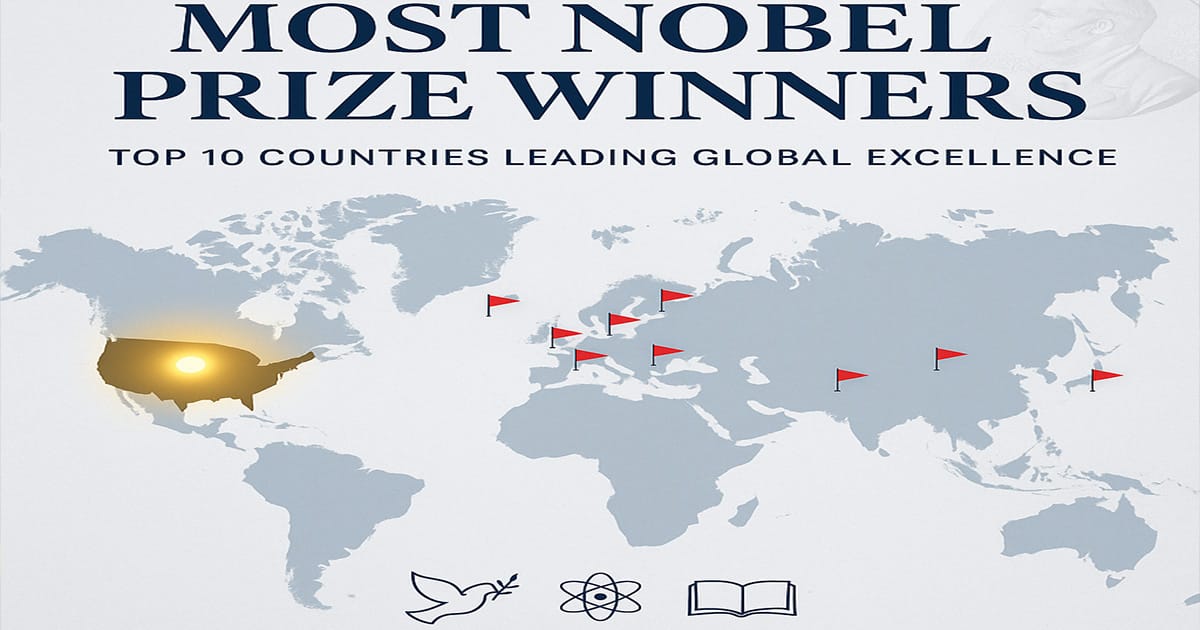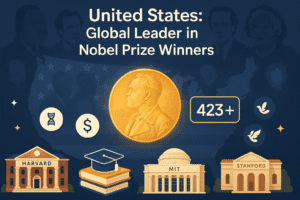Most Nobel Prize winners come from a select group of countries that consistently lead in innovation and transformative ideas. The Nobel Prize stands as a global symbol of excellence, and every year, nations eagerly watch as their brightest minds are honored on the world stage. But which countries dominate this prestigious list? From science and literature to peace efforts, a few nations rise above the rest. This report highlights the top 10 countries that have produced the highest number of Nobel laureates.
Most Nobel Prize Winners by Country: See Who Tops the Global List
| Rank | Country | Approx. Nobel Laureates |
|---|---|---|
| 1 | United States | 423+ |
| 2 | United Kingdom | 143+ |
| 3 | Germany | 115+ |
| 4 | France | 76+ |
| 5 | Sweden | 34+ |
| 6 | Japan | 31+ |
| 7 | Russia/Soviet Union | 30+ |
| 8 | Canada | 28+ |
| 9 | Austria | 25+ |
| 10 | Switzerland | 25+ |
Note: Counts are approximate and reflect both solo and jointly awarded Nobel Prizes up to 2023.
United States: Global Leader in Nobel Prize Winners
United Kingdom: Rich Legacy of Nobel Excellence
The United Kingdom holds a prestigious position with approximately 143 Nobel Prize winners, making it one of the top nations globally. Renowned for its deep-rooted contributions to literature, physics, and science, the UK has produced iconic laureates like Winston Churchill, Alexander Fleming, and Peter Higgs. Prestigious institutions like Oxford and Cambridge have consistently nurtured groundbreaking ideas and produced generations of Nobel-worthy intellects. From pen to particle, the UK’s influence spans both the arts and sciences, reflecting a balanced legacy of creativity, innovation, and global impact.
Germany: A Powerhouse of Scientific Nobel Achievements
Germany has produced over 115 Nobel Prize laureates, establishing itself as a global hub of scientific excellence. German scientists and researchers, especially in physics and chemistry, have historically played a pivotal role in shaping the foundations of modern science through groundbreaking discoveries. Icons like Albert Einstein, Max Planck, and Werner Heisenberg emerged from its academic institutions, including Humboldt University and the Max Planck Society. Germany’s Nobel legacy has endured through the political turmoil of the 20th century, continuing to shape global science and thought. Its commitment to research, innovation, and higher education continues to make it a leading force in the global scientific community.
France: A Cultural and Intellectual Force in Nobel History
France has received 76 Nobel Prizes, with particularly strong recognition in the fields of literature and peace. With iconic laureates like Jean-Paul Sartre, Albert Camus, and Marie Curie, the country has long celebrated intellectualism, philosophy, and scientific discovery. France’s renowned institutions and rich cultural heritage have nurtured generations of influential thinkers, writers, and humanitarians. Whether through groundbreaking novels or global peace efforts, France’s Nobel legacy reflects its deep influence on both the arts and global humanitarian progress.
Sweden: Home of the Nobel Prize and a Contributor to Its Legacy
Sweden, the birthplace and host of the prestigious Nobel Prize ceremony, has also made a noteworthy mark with 34 Nobel laureates of its own. Though modest in size, Sweden’s contributions extend impressively across medicine, physics, chemistry, and peace. Renowned scientists like Svante Arrhenius and peace advocates like Dag Hammarskjöld exemplify the country’s intellectual and humanitarian spirit. Its strong academic institutions, such as Karolinska Institute and Uppsala University, continue to foster global research and innovation. Sweden’s dual role—as both a host and an achiever—cements its legacy as a nation deeply committed to the advancement of knowledge and human progress.
Japan: Innovation-Driven Nation with Rising Nobel Recognition
Japan has earned 31 Nobel Prizes, solidifying its status as a global leader in science and technology. Renowned for its innovation in physics, chemistry, and medicine, Japan’s laureates reflect decades of disciplined research and academic excellence. Scientists like Shuji Nakamura and Yoshinori Ohsumi have brought international acclaim to Japanese institutions. With a strong emphasis on education, precision, and innovation, Japan continues to make remarkable contributions to the world’s scientific and technological advancement through its Nobel achievements.


Russia/Soviet Union: Nobel Legacy Rooted in Science and Literature
Russia and the former Soviet Union have produced 30 Nobel laureates, leaving a significant imprint on both science and literature. The nation has a rich intellectual tradition, with groundbreaking work in physics and notable literary achievements. Figures like Lev Landau in physics and Alexander Solzhenitsyn in literature exemplify the country’s depth of thought and resilience. In spite of political challenges and periods of censorship, Russian intellectuals and authors have consistently gained international acclaim. This legacy highlights Russia’s enduring contribution to the Nobel Prize story through creativity, intellect, and scientific brilliance.
Canada: A Quiet Force in Nobel Excellence
Canada has produced 28 Nobel Prize winners, earning global respect for its contributions, particularly in medicine and peace. Canadian researchers have played key roles in advancing medical science, while peacekeeping efforts have brought international acclaim. Frederick Banting, whose role in discovering insulin revolutionized medicine, and Lester B. Pearson, a pioneer of global peacekeeping efforts, are among Canada’s most respected Nobel Prize recipients. With a strong focus on humanitarian values and scientific research, Canada continues to be a quiet yet impactful force in the global Nobel community.
Austria: A Nobel Heritage of Art and Innovation
Austria has 25 Nobel laureates to its name, showcasing a remarkable legacy that spans both the arts and sciences. From groundbreaking work in medicine and physics to profound contributions in literature and peace, Austria’s influence is both deep and diverse. Notable Austrian Nobel laureates include Erwin Schrödinger for his groundbreaking work in physics and Elfriede Jelinek for her contributions to literature. Vienna, long a center of intellectual and cultural life, continues to inspire excellence. Austria’s Nobel history reflects its rich tradition of innovation, creativity, and scholarly achievement.
Switzerland: A Neutral Nation with a Nobel-Winning Legacy
With 25 Nobel Prizes to its name, Switzerland has made a notable mark in both global peace efforts and scientific progress — especially in the field of chemistry. As a nation known for neutrality and diplomacy, it has played a central role in global peace efforts—highlighted by awards to organizations like the Red Cross, founded in Geneva. Swiss scientists have also made groundbreaking discoveries in chemistry and medicine. With world-class research institutions and a strong commitment to humanitarian values, Switzerland continues to be a quiet yet powerful contributor to the legacy of Nobel Prize excellence.
Last Updated: June 28, 2025 (Based on data till 2023)
You might also like
Join our official WhatsApp Channel RealSource24 for breaking news, trending headlines, and real-time alerts — all in one place!

